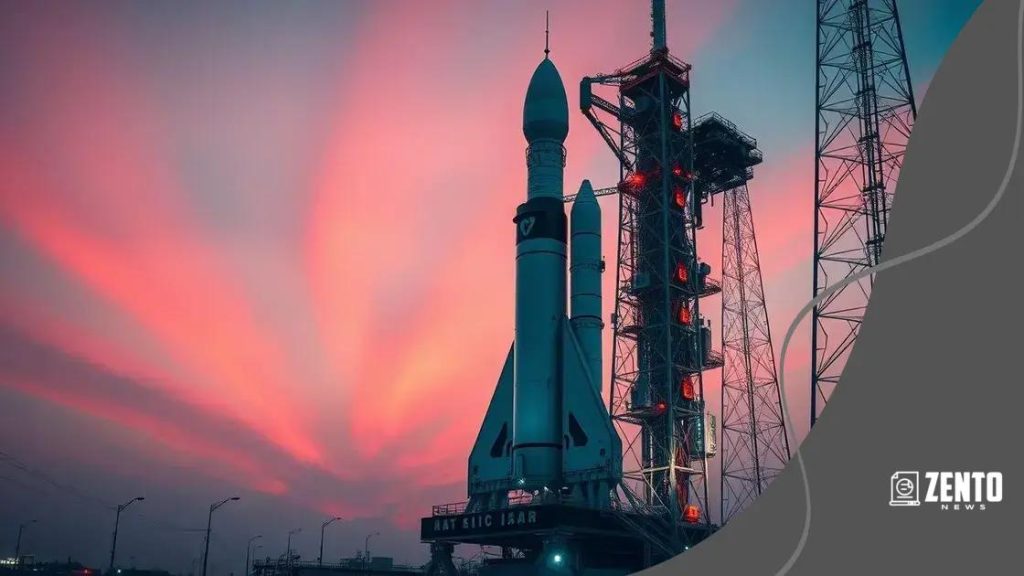New space launches scheduled: what to expect this year

Anúncios
New space launches scheduled for 2024 promise to enhance scientific research through improved data collection, international collaboration, and technological advancements, while addressing challenges such as funding, space debris, and astronaut health.
New space launches scheduled this year are stirring excitement in the scientific community and beyond. With various missions on the horizon, it’s a thrilling time to explore what’s in store.
Anúncios
Key upcoming launches to watch
There are several key upcoming launches that everyone is talking about this year. Each of these launches has the potential to redefine our understanding of space and technology. Understanding what’s happening in the world of space exploration helps us appreciate the incredible feats of innovation.
NASA’s Artemis II Mission
The Artemis II mission, scheduled for later this year, is an exciting step in returning humans to the Moon. It aims to include a crew who will orbit the Moon before returning safely to Earth.
- Launch date: November 15, 2024
- Objectives: Prepare for future lunar landings
- Significance: Testing systems for crewed missions
This mission is part of a larger plan that envisions a sustainable human presence on the Moon.
Anúncios
SpaceX’s Starship Test Flight
Another launch that has caught much attention is SpaceX’s Starship test flight. This ambitious project aims to deliver larger payloads to orbit and, eventually, prepare for missions to Mars.
- Launch window: Late 2024
- Technology: Fully reusable spacecraft
- Impact: Potential for interplanetary travel
Such advancements are crucial as humanity aims to expand its reach beyond Earth.
James Webb Space Telescope Launches
The James Webb Space Telescope continues to revolutionize our exploration of the cosmos. Several follow-up missions are planned to support ongoing observations.
- Next observation campaigns: Scheduled throughout 2024
- Goals: Study exoplanets and galaxy formations
- Importance: Gather data that was previously unattainable
These missions are set to provide groundbreaking insights into the universe and our place in it.
Staying updated on these key upcoming launches allows enthusiasts and scientists alike to prepare for the exciting discoveries that lie ahead. With such innovative missions on the horizon, the future of space exploration looks incredibly bright.
Technological advancements in space travel
Recent technological advancements in space travel have significantly changed how we explore the universe. Innovations in propulsion, materials, and robotics are paving the way for a new era in space exploration.
Propulsion Technologies
One of the most exciting developments is in propulsion technologies. Advancements in rocket engines, such as reusable rockets and ion propulsion systems, are making space travel more efficient and cost-effective.
- Reusable rockets reduce costs by allowing the same hardware to be flown multiple times.
- Ion propulsion systems increase fuel efficiency, enabling deeper space missions.
- These innovations lower barriers to entry for space exploration.
By cutting costs and improving technology, agencies and companies can send more missions into space.
Smart Materials
Another crucial area of development is the use of smart materials. These materials can withstand extreme temperatures and reduce weight, making spacecraft more durable and efficient.
- Temperature-resistant alloys ensure spacecraft survive harsh conditions.
- Lightweight composites decrease the overall weight, allowing for more cargo.
- Advanced shielding materials protect against radiation and micrometeoroids.
Smart materials enhance the reliability of long-duration missions and interplanetary travel.
Robotics and Automation
Finally, robotics play a vital role in modern space missions. Advanced robotics can conduct repairs, analyze samples, and even assist astronauts in space.
- Robotic arms can perform precise tasks in space environments.
- Automated systems help reduce human error during critical operations.
- Unmanned vehicles can explore areas of space too dangerous for humans.
These innovations in robotics streamline operations and extend mission capabilities, making them safer and more effective.
These technological advancements in space travel not only enhance our current capabilities but also prepare us for future explorations beyond our solar system. As technology continues to evolve, so too will our understanding of the universe.
International collaborations in 2024

This year, international collaborations in 2024 are set to enhance our efforts in space exploration. Various countries are joining forces to share knowledge, resources, and technology, which fosters innovation and expedites research.
Joint Missions
One notable collaboration is the joint mission between NASA and the European Space Agency (ESA). This mission will focus on exploration beyond our Moon, aiming at Mars and asteroids. By working together, both agencies hope to:
- Enhance scientific research capabilities.
- Share costs and resources, making missions more feasible.
- Utilize the unique expertise of each agency.
Such missions highlight the benefits of pooling international talents and technology.
Data Sharing Initiatives
Another important aspect of international collaborations is the establishment of data sharing initiatives. Countries are beginning to exchange data collected from satellites and telescopes, leading to a better understanding of space.
- Sharing observational data enhances research quality.
- Joint databases allow for comprehensive studies of celestial phenomena.
- Collaborative tools increase accessibility for researchers worldwide.
This integration of information is key for breakthroughs in space science.
Collaborative Research Projects
Additionally, several countries are coming together for collaborative research projects, tackling challenges such as deep space travel and sustainable technology. These projects seek to:
- Develop innovative life support systems for long-duration missions.
- Create shared platforms for spacecraft testing and development.
- Focus on environmental sustainability in space missions.
Through joint efforts, nations can innovate more effectively and ensure the safety of future explorations.
The focus on international collaborations in 2024 underscores a shared goal: to expand our reach into the universe while ensuring that advancements benefit all humanity.
Impact of new launches on scientific research
The impact of new launches on scientific research cannot be overstated. Each mission into space brings new data and insights that help scientists understand the universe better. Recent launches have unlocked a wealth of information, driving discoveries and advancements in various fields.
Enhanced Data Collection
New missions are equipped with cutting-edge instruments designed to collect a wide range of data. This technology increases our understanding of planetary systems, cosmic phenomena, and the universe’s origins. For instance, sophisticated sensors help gather information on:
- Atmospheric conditions on other planets.
- Radiation levels in space.
- Gravitational waves from distant galaxies.
This data is essential for creating accurate models and theories about space.
Collaboration with Earth-Based Research
As new launches provide rich data, they also facilitate collaboration with earth-based research. Scientists on Earth can analyze the results from missions, leading to further investigations and experiments. This synergy often results in:
- New hypotheses about life in the universe.
- Insights into climate change from studying other planets.
- Technological advancements because of the challenges faced in space missions.
By combining data from space and Earth, researchers can address complex questions about our planet and beyond.
Inspiration for Future Generations
New launches also play a crucial role in inspiring future scientists and explorers. The excitement surrounding missions captures the public’s attention and encourages young people to pursue careers in science, technology, engineering, and mathematics (STEM). As they observe the success of these launches, they are motivated by ideas such as:
- The possibility of life beyond Earth.
- Humanity’s role in advancing knowledge.
- Innovative technologies that stem from space exploration.
This inspiration drives the next wave of discoveries, ensuring that scientific research continues to evolve.
The impact of new launches on scientific research is profound. As we send more missions into space, we gather unprecedented data, drive innovation, and inspire generations to come.
Challenges facing space exploration today
The challenges facing space exploration today are numerous and complex. As we venture deeper into the cosmos, scientists and engineers encounter obstacles that require innovative solutions and collaboration across the globe.
Funding Limitations
One major challenge is securing adequate funding for space missions. Many space agencies rely on government budgets, which can fluctuate based on political priorities. This uncertainty can lead to:
- Delay in mission timelines.
- Reductions in proposed projects and research.
- Challenges in maintaining talented teams of scientists.
Without stable funding, the progress of space exploration can be significantly hampered.
Technological Barriers
Advancements in technology are essential for overcoming the harsh realities of space. However, developing these technologies presents its own set of difficulties. Some examples include:
- Creating reliable life support systems for long-duration missions.
- Developing propulsion systems capable of deep space travel.
- Innovation in materials that can withstand extreme conditions.
These technological barriers require significant research and testing to ensure safety and effectiveness.
Space Debris
Another pressing challenge is the growing issue of space debris. As more satellites and spacecraft are launched, the amount of debris in orbit increases, posing risks to operational missions. This necessitates:
- Improved tracking of space debris.
- Strategies for debris removal and mitigation.
- International cooperation to establish guidelines for space traffic management.
Addressing space debris is crucial for ensuring safe operations in orbit.
Finally, the physical and psychological effects of space travel on astronauts are also concerning. Long periods in microgravity can lead to health issues, while isolation and confinement can affect mental well-being. Understanding these impacts is essential for missions that last for extended periods.
In conclusion, space exploration is at a thrilling point. With exciting new launches scheduled, the collaboration of international teams, and advancements in technology, the future holds immense potential. However, challenges like funding, space debris, and astronaut health must be tackled to ensure safe and successful missions. By overcoming these obstacles, we can unlock even greater discoveries and inspire future generations to reach for the stars.
FAQ – Frequently Asked Questions About Space Exploration
What are the key challenges in space exploration today?
Key challenges include funding limitations, technological barriers, space debris, and ensuring astronaut health during missions.
How do new launches impact scientific research?
New launches enhance data collection, facilitate collaboration with earth-based research, and inspire future generations of scientists.
What role does international collaboration play in space missions?
International collaboration combines resources, knowledge, and technology from various countries, increasing the success rates of missions.
Why is funding important for space exploration?
Adequate funding is crucial for developing technology, ensuring mission timelines, and maintaining skilled teams to conduct research.





